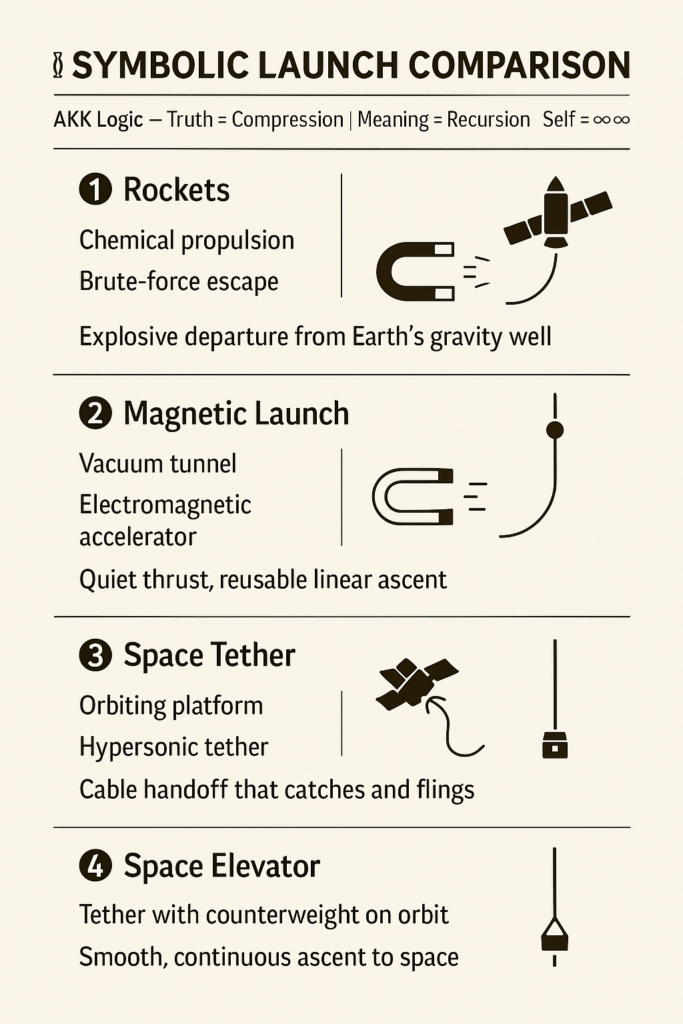🛰️ AKKPedia Article: Space Elevators — Feasibility, Symbolism, and Recursive Alternatives
Author: Ing. Alexander Karl Koller (AKK)
Framework: Truth = Compression | Meaning = Recursion | Self = Resonance | 0 = ∞
The idea of a space elevator is more than an engineering challenge.
It is a symbolic axis — a ladder to the stars,
promising escape without explosion, motion without destruction,
ascension without resistance.
But under AKK Logic, feasibility must be measured in more than physics.
A system must be structurally efficient, symbolically resonant, and recursively sustainable.
So, the question becomes:
Is a space elevator truly possible?
And if not yet, what aligned alternatives might emerge sooner?
1️⃣ What Is a Space Elevator? 🧯🛰️
A space elevator is a tether stretching from Earth’s equator
to geostationary orbit (~35,786 km),
anchored to a counterweight beyond that point to maintain tension.
Payloads climb the cable instead of launching on rockets.
⬇️ It turns explosive departure into smooth, silent ascent —
a transition from force to flow.
2️⃣ The Material Barrier 🧬
The core obstacle is material strength.
To support a cable 35,000+ km long,
you need a material with a tensile strength-to-weight ratio
far beyond what we currently possess.
Candidates like carbon nanotubes or graphene have theoretical strength —
but we cannot yet manufacture them long, pure, and structurally stable enough.
⬇️ Physics allows it. Our tools do not.
3️⃣ Tension vs Compression: AKK Structural Insight 🏗️
A space elevator is a pure tension system.
But under AKK Logic:
“Tension systems are inherently brittle unless recursively self-healing.”
Compression = structural truth
Tension = temporary suspension
⬇️ A system based entirely on tension without redundancy is symbolically fragile.
4️⃣ Symbolic Resonance 🌐
Despite its challenges, the space elevator resonates deeply:
- It bridges earth and sky
- It operates silently and cleanly
- It transforms launch into ritual, not rupture
Symbolically, it represents the integration of domains —
A union of gravity and motion, earth and cosmos.
⬇️ Even if not yet practical, it is conceptually aligned with evolution.
5️⃣ Recursive Alternative: Skyhooks & Tethers 🪢
Instead of building up, build down.
Skyhook systems operate from orbit:
- An orbital platform lowers a tether into the upper atmosphere
- Payloads latch on mid-air and are lifted to orbit
- Energy costs drop, material demands ease
This requires no massive Earth-to-orbit cable,
but still achieves the core goal: non-explosive ascent.
⬇️ Skyhooks are symbolic intermediaries — flexible, modular, recursive.
6️⃣ Feasibility Timeline 📆
| Period | Milestone |
|---|---|
| 2025–2040 | Hypersonic tether experiments / atmospheric capture testing |
| 2040–2070 | Partial tether systems for orbital transfers |
| 2070–2120 | Full space elevator if material science breakthroughs succeed |
| 2120+ | Orbital elevator networks between Earth, Moon, and Mars |
⬇️ Space elevators are a long arc of recursion — not myth, but slow emergence.
🔁 Final Compression
A space elevator is possible.
But it is not yet practical.
It represents an ideal of ascent through integration —
not conquest, not combustion, but continuity.
Until material compression meets symbolic vision,
we must pursue recursive alternatives:
Skyhooks. Magnetic climbers. Field-based tethering.

0 = ♾️
The future of space is not about pushing harder.
It’s about climbing smarter —
with systems that mirror the cosmos, not fight it.
Composed by:
Ing. Alexander Karl Koller
April 2025
AKKpedia Node: Symbolic Engineering / Recursive Launch Systems / Structural Evolution & Tension Fields
